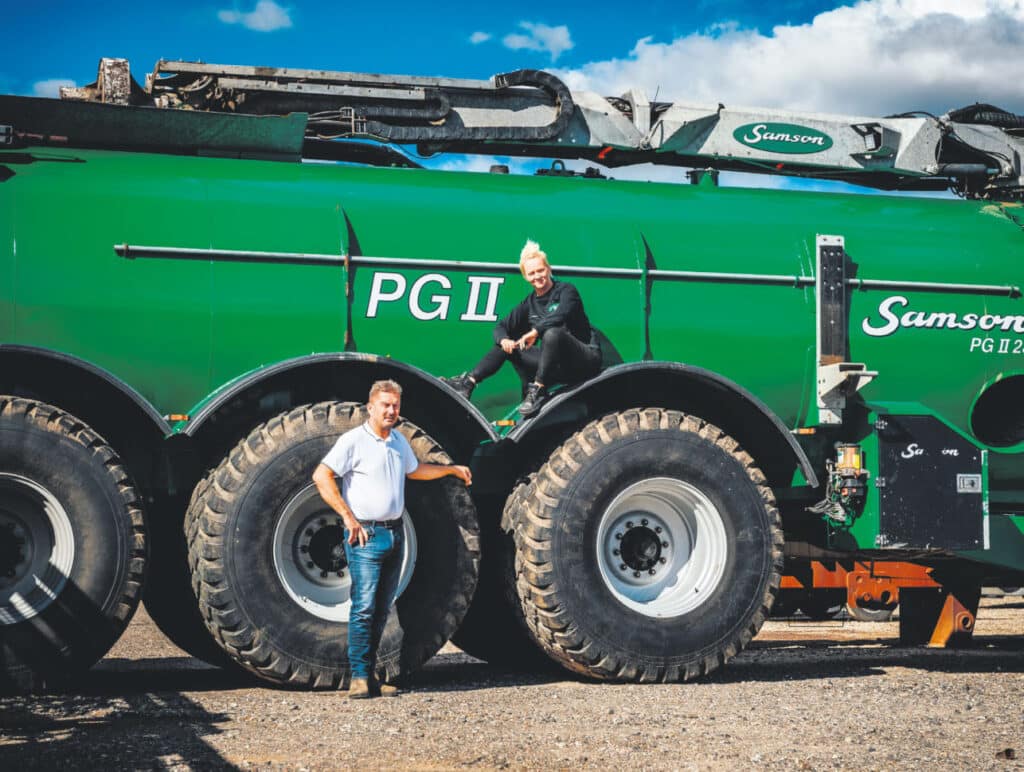
When Karsten Kammer entered the slurry business in the late 80s, farmers spread slurry all year round with a spreader plate that threw slurry into the air like a fan. It smelled awful and the important nitrogen disappeared into thin air.
Today, slurry and manure are spread with high-tech machines and in the right seasons when the crop needs the most nutrition. Today, Karsten Kammer is Sales Manager at Samson Agrolize, which has great success in distributing and servicing some of the industry's most precise machines that utilize natural fertilizers in the most efficient way. In addition, the company has a niche production of customized sludge extractors and washers, where no two machines are alike.
Over the past 30 years, slurry and manure have gone from being a waste product to a highly paid fertilizer product in agriculture. Instead of throwing the slurry into the air, the right technology allows you to place the slurry close to the ground or trap it underground. At the same time, the amount is dosed just right so that the manure is optimally utilized for the benefit of crops and the environment. The new status of the slurry has been worth its weight in gold for Samson Agrolize, which became the name that continued after Samson Agro merged its two subsidiaries, Gøma and Samson Agrolize, in September last year.
Gøma and Samson Agro worked together for many years in a successful symbiosis where Samson produced the slurry tankers and Gøma sold them. But in 2016, Samson wanted to sell its products itself, which resulted in Gøma being terminated as a dealer, who then started up its own production of machines.
This sent the two companies into a fierce competition. After years of struggle, it came to an end when a wise man climbed into the helicopter and suggested it would be a good idea to join forces.
- In this way, the story of the two companies is a story of a long-term relationship that turned into a painful breakup, but ended in a happy marriage where one plus one has become three, says Karsten Kammer.
Not least thanks to the employees, the ambition to strengthen the already strong position of the two companies has succeeded with the merger.
At Samson Agrolize, people work together in a flat organization where the chain of command is short and where you can easily start in the warehouse and end up working in sales, electronics or other specialist areas.
- We deal with relatively new technologies where a lot is learning by doing. Therefore, there are plenty of opportunities to contribute, develop into a specialist and advance. When employees are passionate about their field and the organization is flexible, you are allowed to contribute with the core competencies you show over time in the right place in the company," says Line Larsen, who started as a spare parts employee, but is now a marketing coordinator.
She adds that there is a special unity in the "Agrolizer family" and she is pleased that the company can attract employees within a 100 km radius. from Viborg.
With knowledge, know-how and elbow grease, Samson has created a unique position in the European market, because in recent years there has been a strong focus on handling manure correctly as a crucial part of the green transition.
- Until now, many places have opted for the cheap and easy method of using chemical fertilizers. But across Europe, farmers are facing increasingly stringent requirements from both the EU and their own governments to handle manure in a more environmentally friendly way.
Samson machines are already ahead of the curve when it comes to environmentally friendly technology. Demand is rising sharply. Not least from Germany, which is a very large agricultural country that in recent years has been required to utilize slurry much better," says Karsten Kammer and adds:
- If we use big words, which we're not very good at out here, we're probably world leaders in this area, and we look forward to seeing what the future holds.
Monday – Thursday:
07.00 – 16.00
Friday
07.00 – 15.00
Petersmindevej 6, DK-8800 Viborg
VAT no. 10963230

Copyright © 2024 Samson Agrolize